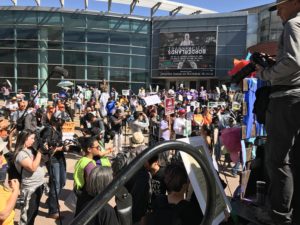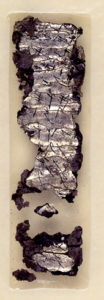I was asked to speak today at the #NoMuslimBanEver rally and march, representing Bend the Arc: Jewish Action which started at the Japanese American National Museum, the place where, in December 1942, Japanese Americans were gathered and sent to concentration camps in various places in the Southwest. This is what I said:

One of the most profound questions that is facing our country today is this: What does it mean to be a citizen? Is citizenship merely the result of an accident of birth? the grant of a certificate? the culmination of a bureaucratic odyssey? Or is citizenship a commitment to certain bonds of mutual responsibility and care? Is citizenship perhaps the promise and practice of upholding the ideals of creating a more perfect union? Are the commitments of citizenship actually those commitments to supporting family and community? To working hard and creating human happiness for self and others?
The Jewish tradition teaches us that it is these latter commitments and obligations: the commitments to mutual care and supporting the weakest among us; to creating a more just and prosperous community and society which defines what a citizen is. And so it is time that we changed the conversation. It is beyond time that we recognize that the dreamers, and their families and all immigrants—documented and undocumented, who are in this city and this country to create a life, to find security or refuge, to enjoy and proliferate the benefits of justice and democracy, are already citizens. We just have to work out how to get them their papers. Continue reading

 Why do we read the book of Jonah on Yom Kippur?
Why do we read the book of Jonah on Yom Kippur?